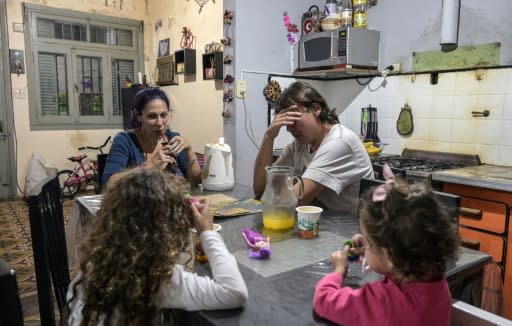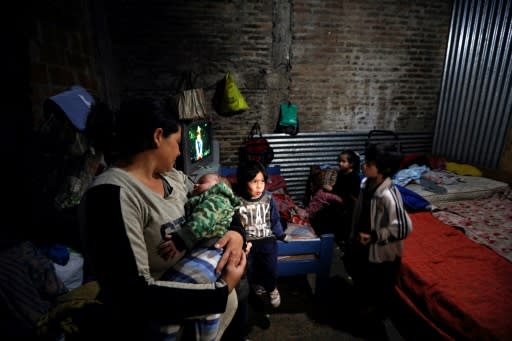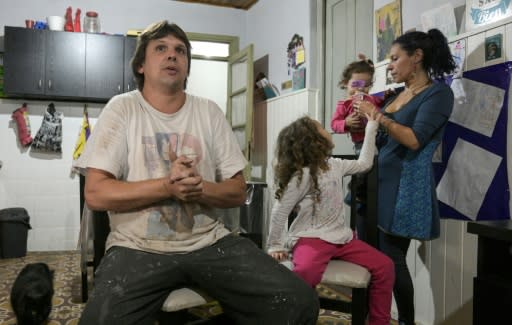Argentina's new poor sink deeper amid recession
Like many Argentines, Daniel Roger and his family found themselves slipping down the social ladder over the past year to join the one-third of their compatriots living below the poverty line. Sideswiped by the country's swirling 57 percent inflation, their rent became too expensive and they were forced to move into a budget hotel to make ends meet. The downward spiral familiar to many Argentines -- a staggering 32 percent of whom are officially classed as poor -- had begun. "Before, we were renting an apartment, but we got to the point where we could no longer pay for it," Roger's wife Andrea Gomez, 26, told AFP. "Now we live in a hotel, in a room that's too small for the four of us. We're paying too much, and now they are going to raise the rent." Gomez fears they will soon have to pack their bags again and find themselves on the street. Roger is an electrician, but since he lost his job a year ago as President Mauricio Macri's austerity drive took hold -- aimed at driving down inflation -- he's had to take a series of odd jobs. The peso fell by around 50 percent against the dollar in a six-month period last year, a collapse that pushed inflation even higher. The couple have had to swallow their pride to broach another step on the downward spiral, availing themselves of one of the many free meal distribution points mushrooming across Buenos Aires, as ordinary people find themselves doing extraordinary things to survive. "You feel bad, it's shameful," says Gomez as she breastfed her youngest child. She fills in for a cleaning company when it has work to give her. With their meager income, they just manage to pay their accommodation. "We get meals and diapers from charities," she says. On street corners across the Argentine capital, outside a church, or on a city square, NGOs and religious organizations offer hot meals, clothes or blankets amid the first chill winds of the austral winter. - Runaway inflation - "For many people, dinner is just a memory," said Bishop Carlos Tissera, the head of the Catholic charity Caritas in Argentina. "We won't solve the problem with handouts, but politically," said Tissera, who has been most alarmed by what he called "middle class impoverishment." The well-off have had to cut out little luxuries like cinema, restaurants and holidays simply to make ends meet. They are the lucky ones. The poorest workers have been rocked by a wave of job losses as factories and small businesses shut down, and now many have to resort to soup kitchens. Over the last 12 months, inflation has reached 57 percent year on year. Argentina's inflation rate is unheard of almost anywhere else outside of crisis-wracked Venezuela -- a monthly hike of three to six percent -- equal to more than the average European country's accumulated rate over two years. A third of the resource-rich South American country's 44 million people now live in poverty, which affects the majority of children. Against this background of economic chaos, Cintia Sosa is bringing up her nine children, ranging from a one-month-old baby to a 15-year-old, in a Buenos Aires suburb. Her brick house in a working-class district of the capital is covered by a corrugated tin roof. Inside, an industrial oven reflects her vanished hopes of building a better life. She wanted to create a business selling pizzas and empanadas -- Argentine savory pastries. But the rising price of gas, flour and other ingredients have clipped her entrepreneurial wings. "We can't make ends meet. We can't get our business off the ground," she said. Her husband's temporary job allows the family to tick over. "As his job is temporary, his wages are not index-linked," to keep pace with runaway inflation, Sosa worries. Their fridge and washing machine have broken down and they don't have the money to pay for repairs. "In the past, I was able to buy sneakers for my children, but money has lost its value," said the young woman, who remains thankful that at least her children attend school and are in good health. Macri's campaign promises to reduce poverty before his 2015 election seem a distant dream. Seven million people receive state aid and 14.3 million are poor, including around three million classed as destitute. Even with two wage packets, many are finding it difficult to cope. Ariel Fernandez, a 41-year-old carpenter, his teacher companion, and their two daughters live in a small house in the Mataderos neighborhood, near Buenos Aires' bustling ring-road. The house is owned by his parents. Between them they earn the equivalent of around $1,200 a month. What matters to them is a quality of life that is disappearing under the strain of near-constant recession. "We're not looking for a life of luxury," said Fernandez, "only to keep the barbecue and the ravioli going at the weekends. Not for the food, but the family gathering around it, but we've lost it." Between the two of them, Argentine couple carpenter Ariel Fernandez (2nd R) and his wife, teacher Natalia Morales (L), earn the equivalent of around $1,200 a month as more and more people in the country fall below the poverty line Cintia Sosa, seen with four of her nine children in Buenos Aires, wanted to start a business selling pizzas and empanadas, but the rising price of gas and flour have clipped her entrepreneurial wings "In the past, I was able to buy sneakers for my children, but money has lost its value," said Cintia Sosa, seen outside her house in Buenos Aires with some of her children "We're not looking for a life of luxury," Argentine carpenter Ariel Fernandez, seen with his wife and children, said of their struggles to make ends meet among runaway inflation rates in the country





